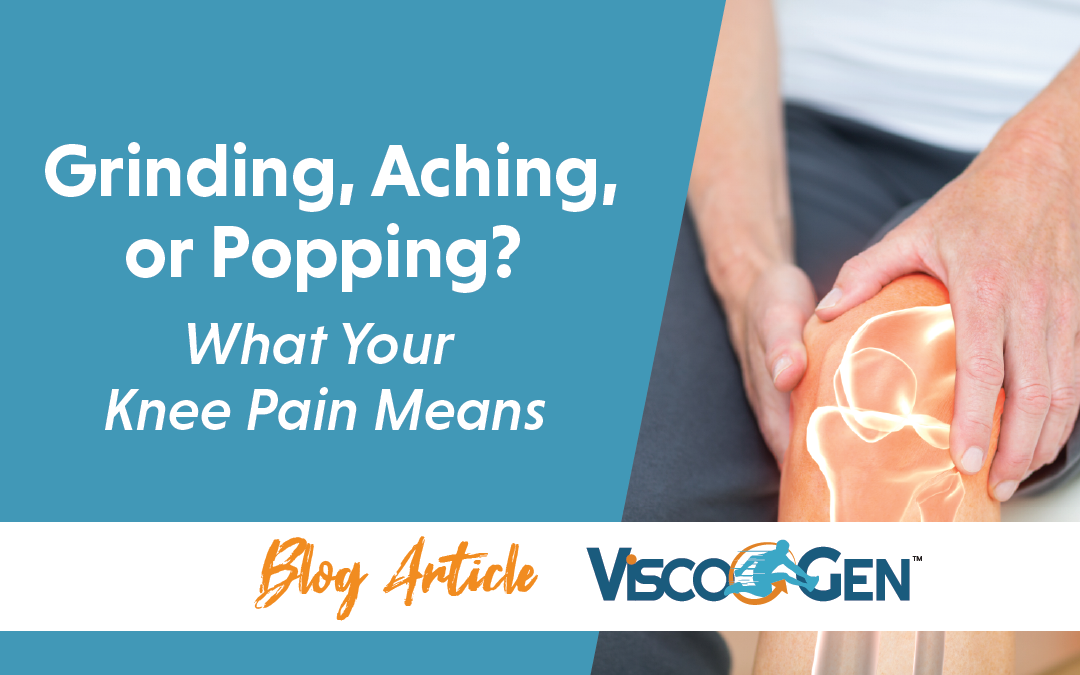Knee pain is a condition that affects people of all ages. The pain can be caused by injuries, mechanical problems, overuse, infection, and medical conditions like arthritis. Generally, knee pain can be treated at home, but there are instances where you will need to seek medical attention. It is important to be familiar with the common symptoms of knee pain and what each of them means to make it easy for you to manage the pain and visit a doctor at the right time.
Here is what to know:
Common Symptoms of Knee Pain
There are several signs that normally accompany knee pain. These include redness and swelling, inability to extend the knee, locking of the knee, and limping. Depending on the nature of the problem, the condition may be characterized by grinding, aching, or popping.
Below are three symptoms and what they actually mean:
Grinding
Knee crepitus is a common noise from the knee. The rough grinding from the knee can be both felt and heard. This crunching sound is usually caused by the cartilage of the knee becoming rough, making it difficult for the bones in the joint to slide as they would normally do. When you place your hand on the kneecap and bend it back and forth, you will feel like you have sandpaper in the joint.
Although this condition is often harmless, it may need medical attention if it occurs following a trauma. You should also visit a doctor if the sound is accompanied by pain and swelling.
Aching
A dull ache in the knee may be caused by damage to the tendons, ligaments, cartilage, or other muscles, which can be due to a strain, misstep, or a twist. However, there are times when patients will suffer such pains without injury, making it difficult to determine the source of the discomfort.
Not all knee pain is serious. However, when the ache is accompanied by swelling, stiffness, warmth to the touch, difficulty flexing the knee, and inability to bear weight on the knee, you should visit a doctor. If left untreated, the condition can cause more pain, joint damage, or even disability.
Popping
Popping knee sounds are usually more audible than grinding sounds but occur less often. Some of the causes of this noise are meniscus tears, loose pieces of cartilage within the joint, or more serious damage to the surface of the knee joint. The noise may also be due to a buildup in air bubbles caused by changes in joint pressure.
Generally, popping and cracking sounds are not a sign of anything serious. However, you should be concerned in case of persistent popping, pain, swelling, or when the knee gives way.
How ViscoGen™ Can Help
When you suffer knee pain, you will need to find a qualified doctor to make an accurate diagnosis and administer the right treatment. At ViscoGen™, we focus on nonsurgical knee and joint pain treatments. Our doctors used to do surgery but have shifted their focus to nonsurgical solutions for pain management. Through injections or our proprietary Joint Visc and Knee Visc5® treatment plans, patients can get pain relief faster. The treatments help you avoid surgery, do not require the use of anesthesia, and are associated with less downtime, meaning you can return to your active life faster.
When you have acute and chronic joint problems, ViscoGen™ will be happy to offer our nonsurgical knee pain program to help relieve the pain. We have highly trained staff and use advanced imaging technology to provide treatment. Contact us today to learn more about Knee Visc5® and schedule your consultation.





When I move my knee cap back and forth there’s a grinding sound. Can I know what that means plus MCL is torn its very painful and I can’t bend my knee
Hi Roslyn! We’re sorry to hear you’re in pain but we would love to help. Give us a call at 407-627-1148 to schedule a consultation.
The inside of my knees burnI can’t lay with my knees touching each other, and there’s this grinding noise. Some days are worse than others just walking tender to the touch and sometime warm. Can someone help me please
Hello
I have had pain in my knee for three years after I tore my radially meniscurs. Pain while going up stairs and down.
Hello sir! We are very sorry to hear that, but our doctors can help you. You can call us at 407-627-1148 and schedule a consultation.
Hi. My left knee pops and is very uncomfortable and it hurts in the crease of my rt leg. The muscle in the back of my rt leg hurts also. I tried he home remedies such as patches, episom salt, and rubbing alcohol. It eases it up but it will start back for while. I wear knee wrap to work. I need relief
It’s only my right knee, I’m 29 been athletic my whole life, but I’m kind outta shape right now. When I put weight on it while it’s at a certain angle whether riding a bike or stepping off the porch or on to it , the pain is very sharp directly on the center of my knee cap? No swelling, redness or heat. I’m 20lbs heavier then Ive ever been. I start training for wildland fire fighting in 1 week, I feel like I just need to work out the supporting muscles an I just went to hard after being inactive for a long time. I am concerned seeing as I start my career in a week.
I’ve had two injuries in my knee before. Ever since I’ve been having problems with my knee. It’s constantly popping and hurting a lot. Sometimes when I cross my legs when I sit and my leg is on top of my knee it hurts so bad as if there’s something in my knee. There’s this weird feeling that something moves around in my knee and if that thing is not in its right place or something it hurts badly which i have to massage my knee for it to go back to its place. Right now out of nowhere my knee in the back hurts so much as if someone’s pulling my ligaments and the pain goes down to my ankles. I’m limping and it’s aching when I move my left leg to the right. I want to know if this is alarming or not but i’m quiet worried.